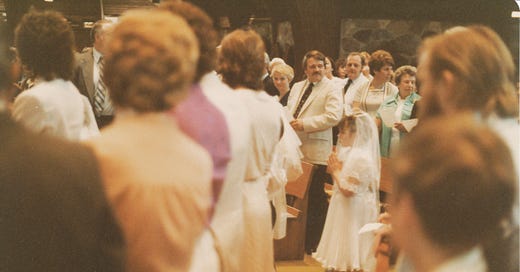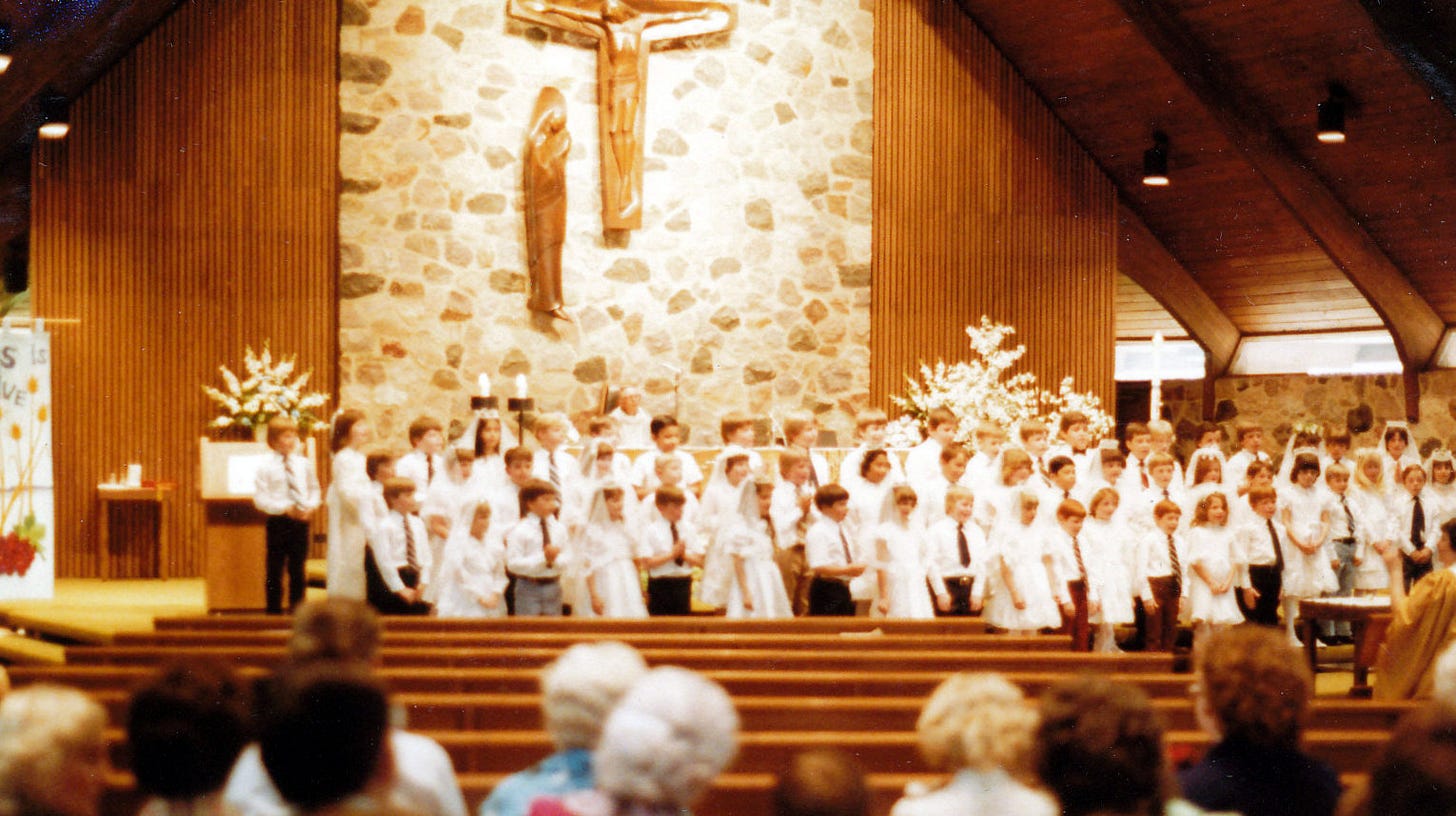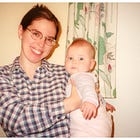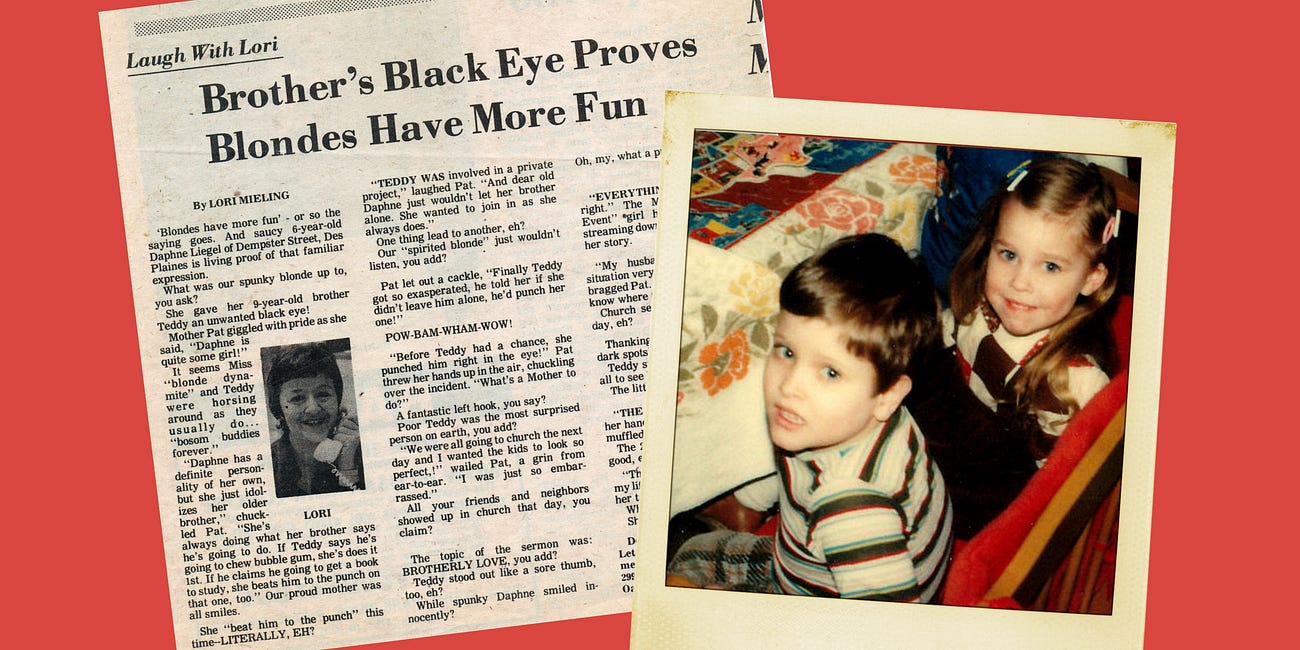Feeling alone at the cafeteria Catholic table
Growing divisions feel arbitrary, political, and even mean. Why do differences need to divide people and families into what feels like separate planets?
In my last post, I described how Catholic cultural divides became new fault lines in my family. "The rad-trad route wasn’t one I wanted to follow. No God’s will voice told me I should. And my own voice told me I should not." Conflict started small and grew to include almost everything, including the most personal.
The new fault lines felt arbitrary, political, and even mean. And my world suddenly felt smaller. I felt all alone at the cafeteria table. It didn’t make sense. Rad-trad what? I kept thinking, ”Isn’t that just another cafeteria Catholic table, picking and choosing different rules aligned with your own personal preferences and sense of self?”
My first window to the world
I grew up Catholic and still am (though some would say I am not). It’s in me. Even when I’ve tried to kick it out—it’s always there. But it’s always changing. Context and understanding change over time. Isn’t that a good thing?
I grew up thinking change was more than okay: learning is good—and I learned that in Catholic school. I also learned it was never okay to impose my own religious beliefs or use them to judge others. And I don’t remember politics or country ever being a part of our Catholic identity.
Since childhood, I’ve been around people of different faiths and people like my husband, who are none of the above. And what could be better?
My faith grew from our townhome blocks filled with families of all different religions, cultures, and backgrounds. Differences were respected and appreciated. Sameness could always be found, too, running around in and out of homes with other free-range kids. It was uncanny how I'd find familiar family dynamics in every home, even if I couldn't understand the language spoken. Though my perspective as a child had a sunny Sesame Street naivete, differences and sameness both make life beautiful and bigger—then and now.
Within my Catholic parish, I felt solidarity too. There’s a leveling feeling when kneeling in the pews, reciting in unison, and knowing we all share in humanity’s glorious goodness and unbelievable shittiness while praying to do good things more than the shitty. And then trying to do better without thinking we’re better.
Of course, it’s not that simple. Life is messy, and relationships are complicated. And once you realize that, you also realize telling which side is driving you or anyone else is often unclear. So making general judgments becomes senseless. Looking within seems wiser.
Figuring out what to do in my own life—that’s enough of a humbling challenge.
Today the choice seems to be between forced conformity and separation. Should some get to pick and choose for others? Should people who choose differently separate further into secular and religious spaces—while religious spaces merge with political ones?
Both options sound bad and also like false binaries. Still, I never imagined questions and choices like that would even enter my mind.
Wholey different worlds
How did this happen? I remember when differences still allowed us to share a similar view or at least see the other person’s point of view.
Sitting smooshed on the gymnasium bleachers, I watched my son graduate high school alongside hundreds of his peers earlier this month. The mood felt very different from when my daughter graduated six years ago. Coming of age in a “new normal,” these new grads seemed united by their chaotic and isolating experiences but hopeful for finding something more meaningful than climbing the ranks, trying to impress, or striving for stuff.
While they shared unique experiences as 2020s teens, it’s mind-boggling to imagine how many different media sources have collectively shaped their worldviews and how little overlap any two random students’ media consumption might have.
There's something for everyone, and each one has different somethings. There's lots to love about that. But lots to worry about too.
Watching the 6:00 PBS NewsHour became my go-to news source back in the MacNeil/Lehrer days. I’d have it on in the background while making study guides during college. Later on, tuning in made the never-ending meal prep and kitchen cleanup feel less drudgery.
No news source is perfect, and bias always exists, but I never imagined that the NewsHour would become a highly controversial source of news. But that’s what it has become for some people I know.
Catholics have their own 24/7 Eternal World Television Network (EWTN) and think tanks that assess the world’s problems, offering Catholic-for-all solutions using Catholic-derived data. Vicariously, I’ve grown familiar with the conservative Catholic perspective, and it’s very different from my own.
It reminds me of that that silly ‘90s book that described men and women as being from different planets1. Except now, it’s expanded into separating people into a zillion different planets. Some lonely and cold. Others hot and firey. All are separated by distances too far to comprehend. And each having their own view of the past.
Algorithmic boxes of nostalgia
I understand nostalgia. I love it and hate it. I long for it and run from it. Either way, it’s often driving me. Holding on is easier than letting go. And it seems even harder to let go today when the past is always accessible in ways humans have never had.
So I understand why the past few decades have felt like non-stop nostalgia. Old-is-new cycles have shortened. Backlash is constant. And cultural divides are widening along varied versions of past events streaming in through mysterious algorithmic formulas.
The Catholic cultural divide centers around the most personal topics—family, reproduction, and gender. I’ve never been nostalgic for those olden days.
Why would we want to go back to when marriage, childbearing and caretaking routinely involved coercion, differences were hidden or shamed, and individual circumstances weren’t even acknowledged?
There were tragic costs paid. Maybe not everyone paid those costs, but they were common enough that most people closely knew someone who did. So the culture changed.
Now, some want to go back. Some people tell me those costs are part of being Catholic. And paying them is your cross to carry.
I value sacrifice too. And I know Catholic shame. But I don't have it over sex or my body in the ways some say I should. Or because I'm just as excited that my daughter found love with a woman instead of a man. Or because I consider marrying my non-believing husband to be the best decision I've ever made.
That's left me feeling alone while others in my family have followed a rad-trad route I can't understand.
Rad-trad what?
I also can’t understand how mommy-war debates have gone on for this long with as many versions of the same old tropes, even as dads are finally being included in the caretaking conversations. Mom-comparing is the worst. And the labels make no sense.
Trad doesn’t even seem rad. No one gave me “dirty looks'' like my mom got in the ‘70s for having four kids. And I even felt weirdly admired by strangers when I was a "stay-at-home mom,” as if my decisions about kids and career were moral decisions—and somehow their business.
If anything, traditional families seem hugely popular today, especially large families with babies and little kids who have cute little-kid problems. Parent problems are fine too, as long as they’re endearing or maybe funny and affect no one other than themselves.
Society seems to like the idea of a family more than the messiness of a real one. That’s a problem, a big problem. So is the idea of a single “ideal” family type, more deserving of respect than other people and families. Why not focus on helping people feel less alone and find or create family? And help support anyone in need.
Traditional, devoutly religious families of ALL faiths deserve to be celebrated. ALL families and people do. But ALL families still aren’t welcome everywhere and people without kids or partners often get excluded too. Why not recognize and respect everyone? What’s so hard about that?
What I’m trying to remember
Having views that once felt shared but now feel different can feel unfamiliar and lonely too. After sitting at my cafeteria Catholic table all alone feeling miserable, I finally got up, looked around, and found interesting and delightful people at every table, including plenty of other Catholics with lots of varying views.
Here are some things I’m trying to keep in mind:
Sharing stories in lots of different ways helps keep alive past lessons learned. Forgetting happens so damn fast. And I don’t want to return to the hiding, holding secrets, and misplaced blame and shame of the past.
Everyone has nostalgic biases. What’s surprising is how different they can be even within the same family and generation. Mine are shaped by '70s Sesame Street secular solidarity, '80s techno-optimism, and '90s "Live Your Best Life" Oprah optimization. Those are baked into me. I'll always have blind spots because of them. So it's easier to understand why seeing the same thing as another person—even someone I love—might not be possible. That helps make personal disagreements feel less personal. And I’m discovering that most of the time, they aren’t.
Don’t stay quiet. Help others speak up and be heard. The internet may be filled with constant chatter, but important things often go unsaid in real life. You can’t make sharing happen, but you can help make it easier. Learning to listen better also helps. I thought I was a good listener until I read Kate Murphy’s “You're Not Listening: What You're Missing and Why It Matters” book. I’m still working on this.
Openness, acceptance, and transparency aren’t just about protecting us from them. It’s about protecting me from myself and us from ourselves—that’s a greater good worth nurturing and growing.
Why stay stuck at one table? My cafeteria Catholic-ness can be carried with me wherever I go. And by not feeling stuck, it’s easier to visit with family at their tables and find ways to have good conversation too.
Next post I’ll focus on how I’m managing family conflict on a personal level. Family relationships are, by nature, emotionally charged. And in the midst of conflict, emotions become supercharged. Figuring out what to do is messy.
Men Are from Mars and Women Are from Venus by John Gray is the book I was referring to above. I’ve never actually read the book. But I remember when it came out in the “Year of the Woman”—1992, the year I graduated high school. The book was talked about everywhere, IRL and all over talk TV. And the book’s title sold a narrative in far greater number than the copies of books sold.
Gender differences seemed waaay exaggerated then. As a sister of three brothers, differences were notably smaller at home beyond the outward facade. More concerning about the book though was that some people seemed to take away the message, “It’s not his fault he can’t control himself.” That’s a dangerous message for everyone, including boys and men. As a mom of two teenage boys, those are not messages I want them to get.
Over thirty years later, genders are still over-typified. My second-grader recently came home from school and said, “I’m just a stupid boy.” After talking with him, I learned the kids at school were talking about the message printed on a shirt a girl was wearing: Girls Shine, Boys Whine.
Everyone can shine, and anyone can “whine”
Yeah, I know. It’s just a shirt. Maybe it had a cool graphic on it. I’m not making more of it than that on a personal level, and told my son not to as well. Still, kids pick up on these messages. Defining half the kids as this or that makes no sense. And the “boys whine” message might discourage boys from doing what everyone should feel free to do: talk about feelings, including hurt ones.













I just looked into Kate Murphy’s book and added it to my reading list. It sounds interesting. Have you read David Brooks book: “How to know a person”? I loved that book. I bought it as an audiobook. He is reading it himself and his voice is wonderful. So it was even better to listen to it.